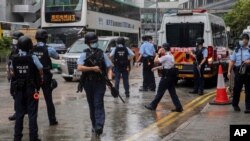Hong Kong has seen an alarming reduction in its population over the last 12 months, as people leave in the wake of the pandemic and the city’s political turmoil.
According to data released by the Census and Statistics Department, Hong Kong’s population has declined by 1.2%, equating to 89,200 people. It’s the biggest decrease in Hong Kong’s population in 60 years, AFP reported.
It comes after Beijing imposed a national security law on the city, cracking down on political dissidents following the anti-government protests in 2019.
Kacey Wong, a visual artist and activist from Hong Kong, recently relocated to Taiwan, citing the far-reaching effects of the security law. He told VOA over the phone that he wants to live somewhere that has “100% freedom of expression,” he said. “For me Taiwan provides that opportunity,” he added.
One of Hong Kong’s well-known artists, Wong, 51, is known for his flair for the visual arts embodied with social activism and politics. But he hasn't gone unnoticed by Beijing, as his name appeared in state-controlled newspaper Ta Kung Pao — which is thought to be China’s wanted list for those who may have broken the security law.
After seeing dozens of lawmakers arrested under the security law, Wong believes that the so-called “red line” of the law in Hong Kong has become so ambiguous that it’s becoming untenable to live with.
“People are saying it’s not the red line anymore, it’s the red sea. It’s a zone that you cannot avoid,” he said.
Wong pointed to how supporters are being targeted for wearing black t-shirts and yellow face mask. The two colors are associated with the pro-democracy movement, and wearing them is seen as a method of protest against the government.
Supporters of the movement have used other methods too, such as publicly reading Apple Daily’s pro-democracy newspaper, before its closure in June.
A government spokesman said the high numbers of those leaving the city are not all necessarily emigrating and the population decline is also due to the lack of new arrivals, a Hong Kong-based newspaper, the South China Morning Post reported.
Additionally, Hong Kong has also had the COVID-19 pandemic to contend with, and although the city has recorded only 12,000 cases with 200 people dead, strict quarantine measures remain.
British visa
An offer of citizenship made by Britain for millions of Hong Kong residents has contributed to thousands leaving, the data suggests.
Following activation of the security law, the British Government announced it would extend the rights of British National Overseas, or BNO, passport holders in Hong Kong, with nearly 3 million residents eligible. The scheme allows Hong Kong residents born before 1997 a “pathway to citizenship” after five years.
An assessment by the British Government estimated that by 2026 up to 300,000 could apply to emigrate, with 34,000 having already applied between January and March.
One Hong Kong resident told VOA that she recently relocated to Taiwan but there is the BNO option, too.
Jenny, which isn’t her real name, said she was arrested during the protests in 2019 and decided to leave Hong Kong last July, fearing jail.
“I’m not sure whether I would get a fair trial or not,” she said.
Hong Kong’s Security Bureau recently told VOA in an email that people were not being targeted based on their political or professional affiliation.
“Any law enforcement actions taken by Hong Kong law enforcement agencies are based on evidence, strictly according to the law, for the acts of the persons or entities concerned, and have nothing to do with their political stance, background or occupation. It would be contrary to the rule of law to suggest that people or entities of certain sectors or professions could be above the law,” the bureau said.
Activists self-exiled
Dozens of lawmakers and activists are facing jail under the security law in Hong Kong, but several managed to flee overseas.
Ted Hui, a former lawmaker in Hong Kong’s mini-parliament, the Legislative Council, left for Australia in late 2020. He was facing nine charges and believes he was being investigated under the security law.
“In the past year, I think the intensity is getting stronger and stronger and level of enforcement. It’s no doubt to me now, a year after the introduction of the NSL, 100% it is the death of one country two systems, a total collapse of Hong Kong’s freedoms. Not any autonomy at all,” Hui told VOA in June.
Teachers’ union disbanded
The political climate in Hong Kong has also pressured civil society groups into closing. Last week the Civil Human Rights Front disbanded. The group was responsible for some of Hong Kong’s largest-ever street protests.
Hong Kong’s Professional Teachers’ Union also disbanded earlier this month after the government cut ties with the union and accused it of spreading anti-Beijing and anti-government sentiment.
The education sector has come under scrutiny ever since the security law was passed, and Hong Kong schools were ordered to remove materials that may violate the legislation.
One teacher, who requested anonymity fearing retaliation, told VOA that there are concerns that “investigations” could be launched if umbrellas were used during practical activities in the classroom. Umbrellas were deployed by protesters during street protests and became symbolic during the pro-democracy movement.
Another teacher quit their role at the Chinese University of Hong Kong citing self-censorship fears and being misreported if discussing texts such as George Orwell.
“I stopped at the university because I felt there’s no way that we’d be able to have the kind of in-class discussions we used before the national security law,” the teacher told VOA.







